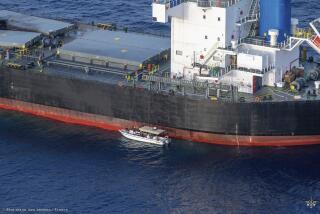Arab Truck Drivers Stalled by U.N. Sanctions : Trade: Jordan’s belated decision to halt most dealings with Iraq delivers a dilemma.
- Share via
RUWEISHED, Jordan — Mahmoud the fertilizer truck driver could go neither forward into Jordan nor back to Iraq.
Jordanian officials told Mahmoud that no imports from Iraq are being allowed under U.N rules. Furthermore, in a fit of zeal, they refused to grant him a permit to turn around and take the fertilizer back to Iraq. Exports, they explained, are also prohibited.
So for nearly two weeks, the stocky truck driver has been languishing in a kind of personal limbo at the Ruweished border crossing into Jordan.
“Does it seem right to you that I cannot go in or go home?” he asked reporters at midweek. “If they want to enforce the punishment on Iraq, fine, but not to the point of craziness.”
Mahmoud’s dilemma results from Jordan’s decision, made after a long delay, to apply U.N. trade sanctions designed to pressure Iraq into withdrawing from conquered Kuwait.
Under intense pressure from the West, Jordan has begun to restrict the flow of goods through its desert corridor into Iraq, to reduce it to “insignificant leakage,” in the words of a Western diplomat.
The U.S. Embassy in Amman has posted a pair of observers at Ruweished to watch the comings and goings and make sure no significant breach takes place.
The potential for trade with Iraq was reduced dramatically by the U.S.-led blockade of Aqaba, Jordan’s port on the Red Sea. But it was still possible for made-in-Jordan products to be shipped overland to Iraq.
Jordan’s decision to comply with the U.N. sanctions, made known by way of a secret memo sent to government offices, has been minimized in Jordan in order to avoid upsetting the largely pro-Iraqi population.
“Nothing goes across,” customs official Nabil Endawi said. “It is forbidden.”
More precisely, oil is still trucked in from Iraq to Jordan in repayment of a debt. Jordan has asked for an exception to Iraqi oil because the country is heavily dependent on it. The United States has been willing to look the other way because no money changes hands.
Some food moves into Iraq, but the long convoys of grain trucks from Aqaba have disappeared. Silos at the blockaded port are empty.
Truck drivers see themselves as victims of the sanctions, and they are unhappy about it. Farid Ali, whose truck was waiting in the lane reserved for vehicles heading for Iraq, said:
“Before the sanctions, there was no room to park in this lot, so many trucks were around. Now look. Hardly anyone is here and most of the trucks are empty.”
Ali’s truck was loaded with cotton, and officials told him it could not pass. Another truck brought chemicals, but their drivers declined to talk with reporters, except to say, “We are with Saddam”--Iraq’s President Saddam Hussein.
Most of the dozen or so vehicles were empty, heading to Iraq to pick up the furniture of refugees fleeing Kuwait.
Few heavy trucks come up the road to Ruweished from Aqaba or Amman. Tire repair shops have closed and mechanics put in half a day at most.
With the political decision discreetly out of the way, Jordan is bracing for economic hardship. In normal circumstances about half of Jordan’s farm and manufacturing production is exported to Iraq, and estimates of what the embargo will cost Jordan this year range up to $2 billion.
Europe and Japan are expected to help, but U.S. aid is in question. King Hussein’s support for Iraq in the crisis over Kuwait has angered several members of Congress. And this was not helped by the appearance in Amman this week of radicals calling for an attack on U.S. interests everywhere in the event of war.
On Tuesday, George Habash, the head of a Marxist faction of the Palestine Liberation Organization, warned of terrorist reprisals.
“At this moment our finger is touching the trigger,” he told reporters. “We will shoot the first moment Iraq is subjected to any aggression.”
Western observers in Jordan say the country’s declining economic prospects will probably compel King Hussein to permit more and more such rhetoric, even while trying to keep street protests under control.
The king was faced with food riots last year and has since tried to make room for wider political expression--expression that includes Palestinian radicalism.
“He will have to open the safety valve further,” a West European diplomat commented. “The blame for economic problems will inevitably fall on the West since few people in Jordan openly blame Saddam Hussein for anything.”
More to Read
Sign up for Essential California
The most important California stories and recommendations in your inbox every morning.
You may occasionally receive promotional content from the Los Angeles Times.













